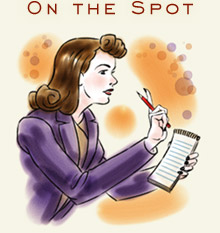Emdashes—Modern Times Between the Lines
The Basics:
About Emdashes | Email us
Ask the Librarians
Best of Emdashes: Hit Parade
A Web Comic: The Wavy Rule
Features & Columns:
Headline Shooter
On the Spot
Looked Into
Sempé Fi: Cover Art
The Element of Doubt: The Art of Reportage at NYU
Filed under: On the Spot Tagged: Adrian Nicole LeBlanc, Alastair Reid, events, Janet Malcolm, Jonathan Taylor, Lawrence Weschler, William Shawn, Wojciech Jagielski

Jonathan Taylor writes:
At Tuesday night's symposium on Ryszard KapuÅ›ciÅ„ski and "The Art of Reportage" at NYU, Alastair Reid read from an address he said William Shawn had given in 1979 to The New Yorker's "business side," which Reid said might not previously have "seen light of day" outside the magazine. Describing what the magazine's editors looked for in a writer, Shawn cited the presence of "style"—a "literary quality," even amid the straightforwardness and simplicity demanded of factual reporting. "Writers who don't sound like nobody, and don't sound like anybody else" (or quite nearly those words); "honesty" and "soundness," not just, or even principally, of factual accuracy, but of "character that shows up in the writing."
Reid was one of three speakers on "Literary Reportage Between Self and Other, Fact and Fiction," the second of the evening's two panels, discussing the role of the first-person narrator, the "I," in the credibility of long-form narratives. He made an elegant and muscular case for the primacy of the literary quality, of the journalists's voice, over the pretense to "objectivity." He quoted Claud Cockburn's attacks on fellow reporters for purporting to gather "facts" as if they were "gold nuggets" on a "frozen ground," and Borges (a frequent interlocutor) on the chasm between called "lived reality" and "word reality." He brought a refreshing lack of hemming and hawing on the subject, given that his subject was, in fact, the element of doubt that should be at the bottom of the reporting enterprise.
Moderator Lawrence Weschler interposed with a complicated anecdote of an observation by Andrew O'Hagan, to the effect that only in fiction can everything be immune to doubt, and that in nonfiction there is always the question, Did it really happen like that? Weschler, upon once recounting this observation, was upbraided by Janet Malcolm, insisting that it was, in fact hers, in The Silent Woman :
In a work of nonfiction we almost never know the truth of what happened. The idea of unmediated reporting is regularly achieved only in fiction. When Henry James reports in The Golden Bowl that the Prince and Charlotte are sleeping together, we have no reason to doubt him, or to wonder whether Maggie is "overreacting" to what she sees"....We must always take the novelist's and the playwright's and the poet's word, just as we are almost always free to doubt the biographer's or the autobiographer's or the historian's or the journalist's. In imaginative literature we are constrained from considering alternative scenarios—there are none. This is the way it is. Only in nonfiction does the question of what happened and how people thought and felt remain open. We can never know everything; there is always more.
Adrian Nicole LeBlanc was brimming over with the doubts posed by her reporter's point of view in her current project, a book about stand-up comedians. In the Bronx of her astonishing Random Family, her status as a journalist was of little account apart from her writings' potential to alert the law, or social services. That reportorial tour de force left her unprepared to manage her point of view amid the blandishments of a entertainment industry determined to control her reporting, and comedians determined to control her as an audience (mirroring her own performance for readers). Her remarks discreetly raised the question of not only the journalist's "I" in reporting, but the journalist as "we" and "you"—the degree to which much journalism is preoccupied with itself (the event itself included).
LeBlanc appeared reluctant to welcome Reid's liberation from the fact-gathering model, saying "I believe there is a world of comedy" and that it's her job to delve in and bring out "the information." But—citing Joseph Mitchell's Joe Gould's Secret as a model along the way—she demonstrated how much rests with her "I," in explaining her doubts and struggles on how to present that information, and whether, or how much, to take the reader along her own path through the story. That path, she said, was made only possible by her own extreme depression at the time, a condition made the comedians genial company. But her emergence from it has created a new distance from her subjects.
Ultimatlely, LeBlanc said her goal in reporting is that the people she writes about will recognize themselves, and that readers, if they were able to discover the backstory of the writing and editing of the book, wouldn't feel betrayed.
Drawing swift chuckles from Polish-speakers in the audience before the translator conveyed his remarks, Polish reportażysta Wojciech Jagielski referred to communist-era journalists' habit of critiquing the regime indirectly through writing on seemingly innocuous topics, exemplified by Kapuścińsk's writing on Ethiopia or the Shah. Jagielski said the habit dies hard for him; even if it's not a matter of covert doublespeak, it's still vital that his journalism be about "something else" in addition to the local events being described, be they in Chechnya or Uganda. He said he found that "other" subject for his book on those countries and others, in the inscription on a gravestone in the Caucusus: He who thinks about the consequences will not become a hero.
An account of the evening's previous panel, "On the Ground and On the Page," will be in a future post.



